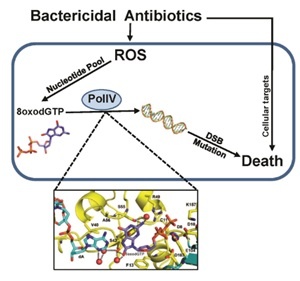 Antimicrobial resistance represents a global health problem of escalating intensity. In order to develop new therapeutic strategies, it is important
Antimicrobial resistance represents a global health problem of escalating intensity. In order to develop new therapeutic strategies, it is important to understand- in fine molecular detail- how antimicrobial agents such as antibiotics achieve function. In the past few years, it has been suggested that antibiotics function through induction of reactive oxygen species (ROS) that damage the bacterial genome. However, this conjecture was challenged and deemed controversial. To resolve this controversy, Dr. Deepak Nair’s group used an approach that inactivates one of the principal mediators of the ill effects of reactive oxygen species- an enzyme known as DNA polymerase IV. This enzyme incorporates nucleotides oxidized by ROS into the genome and this ultimately leads to catastrophic DNA damage and cellular death. The group elucidated the mechanism utilized by DNA polymerase IV to incorporate oxidized nucleotides in the genome. Knowledge of the mechanism allowed them to specifically perturb the activity of DNA polymerase IV vis-a- vis ROS and this exercise led to significant enhancement in bacterial survival. Their studies therefore show that induction of ROS contributes significantly to the antimicrobial activity of antibiotics and provide an avenue to improve the efficacy of modern antibiotics. The full study can be accessed here:
to understand- in fine molecular detail- how antimicrobial agents such as antibiotics achieve function. In the past few years, it has been suggested that antibiotics function through induction of reactive oxygen species (ROS) that damage the bacterial genome. However, this conjecture was challenged and deemed controversial. To resolve this controversy, Dr. Deepak Nair’s group used an approach that inactivates one of the principal mediators of the ill effects of reactive oxygen species- an enzyme known as DNA polymerase IV. This enzyme incorporates nucleotides oxidized by ROS into the genome and this ultimately leads to catastrophic DNA damage and cellular death. The group elucidated the mechanism utilized by DNA polymerase IV to incorporate oxidized nucleotides in the genome. Knowledge of the mechanism allowed them to specifically perturb the activity of DNA polymerase IV vis-a- vis ROS and this exercise led to significant enhancement in bacterial survival. Their studies therefore show that induction of ROS contributes significantly to the antimicrobial activity of antibiotics and provide an avenue to improve the efficacy of modern antibiotics. The full study can be accessed here:
https://www.ncbi.nlm.nih.gov/pubmed/26757158


